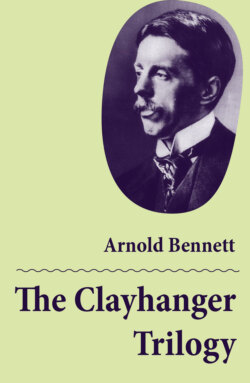Читать книгу The Clayhanger Trilogy (Consisting of Clayhanger + Hilda Lessways + These Twain) - Arnold Bennett - Страница 65
На сайте Литреса книга снята с продажи.
Four.
ОглавлениеEdwin could not keep out of the printing office. He went inconspicuously and, as it were, by accident up the stone steps, and disappeared into the interior. When you entered the office you were first of all impressed by the multiplicity of odours competing for your attention, the chief among them being those of ink, oil, and paraffin. Despite the fact that the door was open and one window gone, the smell and heat in the office on that warm morning were notable. Old sheets of the “Manchester Examiner” had been pinned over the skylight to keep out the sun, but, as these were torn and rent, the sun was not kept out. Nobody, however, seemed to suffer inconvenience. After the odours, the remarkable feature of the place was the quantity of machinery on its uneven floor. Timid employes had occasionally suggested to Darius that the floor might yield one day and add themselves and all the machinery to the baker’s stores below; but Darius knew that floors never did yield.
In the middle of the floor was a huge and heavy heating stove, whose pipe ran straight upwards to the visible roof. The mighty cylinder machine stood to the left hand. Behind was a small rough-and-ready binding department with a guillotine cutting machine, a cardboard-cutting machine, and a perforating machine, trifles by the side of the cylinder, but still each of them formidable masses of metal heavy enough to crush a horse; the cutting machines might have served to illustrate the French Revolution, and the perforating machine the Holy Inquisition.
Then there was what was called in the office the ‘old machine,’ a relic of Clayhanger’s predecessor, and at least eighty years old. It was one of those machines whose worn physiognomies, full of character, show at once that they have a history. In construction it carried solidity to an absurd degree. Its pillars were like the piles of a pier. Once, in a historic rat-catching, a rat had got up one of them, and a piece of smouldering brown paper had done what a terrier could not do. The machine at one period of its career had been enlarged, and the neat seaming of the metal was an ecstasy to the eye of a good workman. Long ago, it was known, this machine had printed a Reform newspaper at Stockport. Now, after thus participating in the violent politics of an age heroic and unhappy, it had been put to printing small posters of auctions and tea-meetings. Its movement was double: first that of a handle to bring the bed under the platen, and second, a lever pulled over to make contact between the type and the paper. It still worked perfectly. It was so solid, and it had been so honestly made, that it could never get out of order nor wear away. And, indeed, the conscientiousness and skill of artificers in the eighteenth century are still, through that resistless machine, producing their effect in the twentieth. But it needed a strong hand to bestir its smooth plum-coloured limbs of metal, and a speed of a hundred an hour meant gentle perspiration. The machine was loved like an animal.
Near this honourable and lumbering survival stood pertly an Empire treadle-machine for printing envelopes and similar trifles. It was new, and full of natty little devices. It worked with the lightness of something unsubstantial. A child could actuate it, and it would print delicately a thousand envelopes an hour. This machine, with the latest purchase, which was away at the other end of the room near the large double-pointed case-rack, completed the tale of machines. That case-rack alone held fifty different founts of type, and there were other caseracks. The lead-rack was nearly as large, and beneath the lead-rack was a rack containing all those “furnitures” which help to hold a forme of type together without betraying themselves to the reader of the printed sheet. And under the furniture rack was the ‘random,’ full of galleys. Then there was a table with a top of solid stone, upon which the formes were bolted up. And there was the ink-slab, another solidity, upon which the ink-rollers were inked. Rollers of various weightiness lay about, and large heavy cans, and many bottles, and metal galleys, and nameless fragments of metal. Everything contributed to the impression of immense ponderosity exceeding the imagination. The fancy of being pinned down by even the lightest of these constructions was excruciating. You moved about in narrow alleys among upstanding, unyielding metallic enormities, and you felt fragile and perilously soft.
